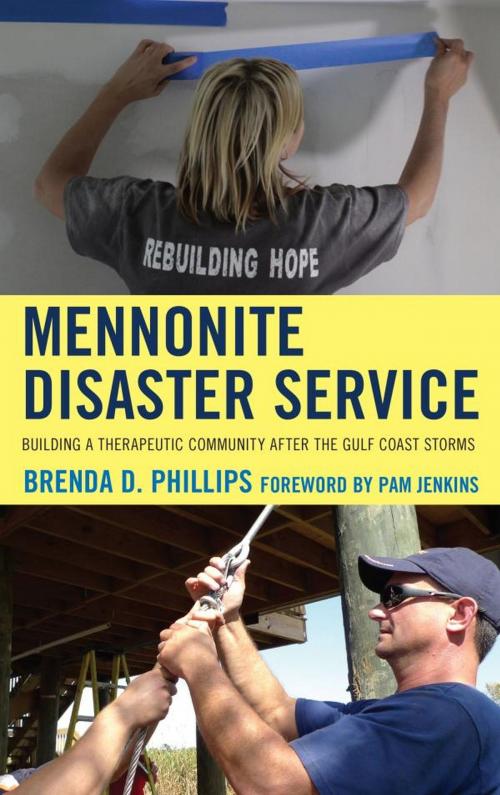Mennonite Disaster Service
Building a Therapeutic Community after the Gulf Coast Storms
Nonfiction, Social & Cultural Studies, Social Science, Anthropology| Author: | Brenda Phillips Ph.D | ISBN: | 9780739185469 |
| Publisher: | Lexington Books | Publication: | November 5, 2013 |
| Imprint: | Lexington Books | Language: | English |
| Author: | Brenda Phillips Ph.D |
| ISBN: | 9780739185469 |
| Publisher: | Lexington Books |
| Publication: | November 5, 2013 |
| Imprint: | Lexington Books |
| Language: | English |
In the aftermath of a traumatic disaster, Mennonite Disaster Service arrives to help. Established in 1950, associated volunteers have gone into devastated communities to pick up debris, muck out homes, and launch rebuilding efforts. These volunteer efforts have succeeded in building more than homes, however. Called the “therapeutic community” by disaster researchers, acts of volunteerism can generate healing moments. Though most studies see such therapeutic effects happening right after disasters, this ethnographic study looks at long-term recovery assistance. Such extensive commitment results in beneficial consequences for survivors and their communities. For Mennonite Disaster Service volunteers, serving others reflects deeply upon their historic roots, cultural traditions, and theological belief system. In contrast to the corrosive blaming that erupted after hurricane Katrina, and feelings of neglect by those who experienced Rita and Ike, the arrival and long-term commitment of faith-based volunteers restored hope. This volume describes and explains how Mennonite Disaster Service organized efforts for the 2005 and 2008 Gulf Coast storms, following a well-established tradition of helping their neighbors. Based on deeply-ingrained religious beliefs, volunteers went to the coast for weeks, sometimes months, and often returned year after year. The quality of the construction work, coupled with the meaningful relationships they sought to build, generated trusting partnerships with communities struggling back from disaster. Based on five years of volunteer work by Mennonite Disaster Service, this volume demonstrates best practices for those who seek to do the same.
In the aftermath of a traumatic disaster, Mennonite Disaster Service arrives to help. Established in 1950, associated volunteers have gone into devastated communities to pick up debris, muck out homes, and launch rebuilding efforts. These volunteer efforts have succeeded in building more than homes, however. Called the “therapeutic community” by disaster researchers, acts of volunteerism can generate healing moments. Though most studies see such therapeutic effects happening right after disasters, this ethnographic study looks at long-term recovery assistance. Such extensive commitment results in beneficial consequences for survivors and their communities. For Mennonite Disaster Service volunteers, serving others reflects deeply upon their historic roots, cultural traditions, and theological belief system. In contrast to the corrosive blaming that erupted after hurricane Katrina, and feelings of neglect by those who experienced Rita and Ike, the arrival and long-term commitment of faith-based volunteers restored hope. This volume describes and explains how Mennonite Disaster Service organized efforts for the 2005 and 2008 Gulf Coast storms, following a well-established tradition of helping their neighbors. Based on deeply-ingrained religious beliefs, volunteers went to the coast for weeks, sometimes months, and often returned year after year. The quality of the construction work, coupled with the meaningful relationships they sought to build, generated trusting partnerships with communities struggling back from disaster. Based on five years of volunteer work by Mennonite Disaster Service, this volume demonstrates best practices for those who seek to do the same.















